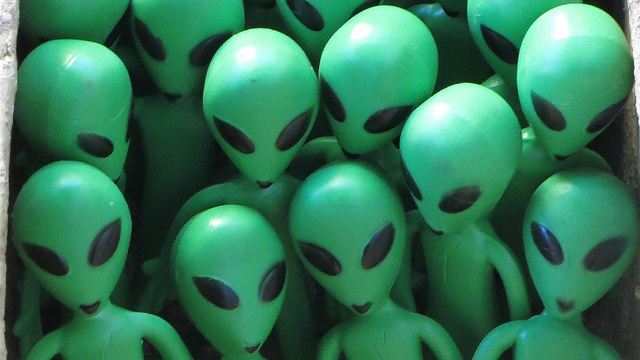
Aliens? (Interdimensional Guardians/Creative Commons)
NASA Working On a New Tool to Search for ET
NASA’s Jet Propulsion Laboratory, in Pasadena, California is developing what they’re calling a ‘chemical laptop’ to help search for extraterrestrial life.
The battery-powered device is actually a miniature laboratory that’s being equipped to consume and analyze samples in order to detect any material that might be associated with life, such as amino and fatty acids.
Once developed, NASA says that they’d like to send it out on a spacecraft to a destination such as Mars or Europa, one of the moons of Jupiter.
NASA describes the device is a chemical analyzer that’s about the size of a laptop computer. And, like a computer their ‘chemical laptop’ can be programmed and reprogrammed to perform a variety of functions.
To see how the chemical laptop performed outside of the laboratory, the researchers conducted a successful field test last year at JPL’s Mars Yard, a simulated Martian landscape. The new device’s next test will take place soon in the Atacama Desert in Chile.
 Scientists Developing Drug to Fight Obesity
Scientists Developing Drug to Fight Obesity
Not all fat is alike.
White fat or ‘bad fat’, what we think of as body fat, is associated with obesity.
But there’s also brown or ‘good fat’, too.
Unlike white fat, brown fat does more than just store fat. According to researchers, it actually burns fat.
Now, scientists at the Baylor College of Medicine in Texas, say that they’ve been able to come up with a way to convert some of the nasty white fat into brown-like fat in mice.
According to the researchers the brown-like fat helps burn up white fat cells by producing heat which in turn results in weight loss.
They say the white to brown-like fat conversion is made possible by activating a thyroid receptor with a synthetic chemical compound they created called GC-1.
The researchers think that their research might lead to a drug like the GC-1 compound to help fight obesity.
Is This Meat Any Good?
You’ve decided to cook-up that piece of meat you bought a few days ago but, wonder if it’s spoiled? Many of us use the old sniff test. If the meat smells kind of “funky” we normally toss it.
But commercial food suppliers who supply tons of meat to consumers need a more than the “sniff method” to determine if the meat they’re about to ship isn’t tainted.
Scientists writing the American Chemical Society’s new journal called ACS Sensors, say that they’ve come up with a new, portable and simple system to determine whether meat is safe to eat.
Using extremely florescent and hollow nanotubes, this newly developed method detects the compounds that are emitted as meat decomposes. The compounds cause the florescent nanotubes to dim. So, weaker the glow the more likely the tested meat is spoiled.
The researchers tested their new system by sealing a gram each of pork, beef, chicken, fish and shrimp in individual containers and letting it sit in a refrigerator for up to four days.
They then exposed their nanotube device to each of the samples and got a reaction in less than an hour. If the tubes glow dropped by more than 10 percent, the researchers found that this meant that the meat was spoiled.
Researchers Find That Gamer Usernames Reveal Personality
Want to be as transparent online as possible? One thing British researchers suggest you do is to be very careful selecting your username.
Psychologists from the UK’s University of York have found that the usernames of those who play online video games reveals much about the actual personalities and even the ages of the individuals themselves.
The researchers made their findings after analyzing player data from the popular multi-player online game “League of Legends”.
They found players whose username included some kind of profanity or other crude words or phrases were also more inclined to be more antisocial in their game-play interactions with others than those with rather benign usernames.
On the other hand they also found that gamers with more positive usernames tended to have positive in-game behavior, which they say could correlate with positive personality traits in the real world.
The data provided to the researchers by the game’s publisher Riot Games contained user names, their in-game behavior and the reaction of other players.
The game’s publisher says some 27 million people from around the world play the “League of Legends” on a daily basis with about 67 million playing every month.
The researchers say that data from online video games could provide valuable insight into the player’s personalities and disorders such as autism, sociopathy or addictive personality.

 Scientists Developing Drug to Fight Obesity
Scientists Developing Drug to Fight Obesity






















Usernames don’t mean a thing!
I have aliens living right next door to me. They’re no bother at all. I spoke to them just once and there are no more whirring lights or strange sounds coming from their direction. I don’t know where they’re from but it’s not any place I’ve ever been. Can NASA’s detector identify curry?